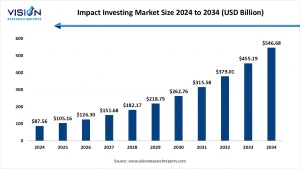The global impact investing market size was estimated at around USD 87.56 billion in 2024 and it is projected to hit around USD 546.68 billion by 2034, growing at a CAGR of 20.10% from 2025 to 2034.
Get a Sample@https://www.visionresearchreports.com/report/sample/41702
Impact Investing Market Growth
Over the past decade, traditional investment strategies have gradually evolved to incorporate Environmental, Social, and Governance (ESG) considerations. The surge in demand for transparency, sustainability, and accountability from stakeholders has fueled interest in impact investing. From institutional investors to millennials and Gen Z investors, there’s a marked preference for portfolios that not only yield financial returns but also positively impact society and the environment. This momentum is being accelerated by global challenges such as climate change, inequality, and the urgent need for healthcare and education in underserved communities.
Another key contributor to the market’s expansion is policy support and regulatory frameworks that encourage ESG investments. Governments and financial institutions worldwide are mandating disclosures on social and environmental risks, while offering incentives for green finance. This regulatory clarity reduces ambiguity and encourages larger pools of capital—such as pension funds, sovereign wealth funds, and development finance institutions—to enter the impact investment space with confidence.
Impact Investing Market Dynamics
Drivers
- Growing awareness and consumer demand for sustainable and ethical investments
- Regulatory support and ESG reporting mandates across regions
- Increased participation of millennials and Gen Z investors
Opportunities
- Expansion of impact funds in emerging markets with high development needs
- Integration of fintech in impact investing for broader accessibility
- Corporate interest in social responsibility and sustainable supply chains
Challenges
- Lack of standardized metrics and frameworks to measure impact
- Risk of impact-washing or mislabeling funds for marketing
- Limited liquidity and scalability in certain asset classes
Impact Investing Market Landscape and Trends
The impact investing market has experienced robust growth as investors increasingly align their financial goals with environmental and social values. ESG (Environmental, Social, and Governance) considerations now play a central role in investment decisions, driving demand for socially responsible assets. Investments span both developed and developing markets, with a strong focus on generating measurable positive outcomes.
- Rising focus on ESG criteria: Investors are prioritizing environmental and social impact alongside financial returns.
- Global expansion: Impact investments are gaining momentum across both emerging and mature markets.
- Diverse sector involvement: Key areas include renewable energy, sustainable agriculture, healthcare, education, affordable housing, and financial inclusion.
- Push for standardization: There is increasing collaboration among stakeholders to establish unified standards and metrics for measuring impact.
- Growing investor interest: Enhanced awareness and commitment to responsible investing are propelling market adoption
Top Companies in Impact Investing Market
- BlackRock
- Goldman Sachs Asset Management
- Bain Capital Double Impact
- TPG Rise Fund
- Bridges Fund Management
- Generation Investment Management
- BlueOrchard Finance
- Global Impact Investing Network (GIIN)
- Calvert Impact Capital
- Triodos Investment Management
Impact Investing Market Segments
- By Investment Type: Private Equity, Venture Capital, Fixed Income, Public Equities
- By Sector: Healthcare, Education, Renewable Energy, Agriculture, Housing, Financial Services
- By Region: North America, Europe, Asia Pacific, Latin America, Middle East & Africa
- By Investor: Institutional Investors, Individual Investors, Development Finance Institutions
Future Outlook
The future of the impact investing market looks promising, underpinned by a generational shift in investment values and increasing accountability from corporations and governments. As frameworks for impact measurement become more robust and technologies enable better tracking and transparency, the sector is poised to enter mainstream financial markets. Capital markets of the future will not only be defined by profit margins, but by purpose-driven metrics that reflect broader societal value.
Buy this Premium Research Report@https://www.visionresearchreports.com/report/checkout/41702
You can place an order or ask any questions, please feel free to contact
sales@visionresearchreports.com| +1 650-460-3308
